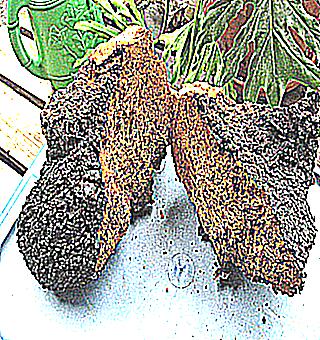Home >
Erectile Dysfunction >
Chaga for potency
Chaga for potency

Chaga is a medicinal mushroom classified as a tinder fungus. Most often, the fungus can be found on birches, mountain ash and alder, elms and maples. The black birch mushroom is known in folk medicine for its intense antitumor and anti-gastritis action.
Botanical Description
Chaga develops on the bark of a tree after being infected with a parasitic fungus. Fungal spores are transmitted by air. Chaga spores, caught on damaged areas of the tree bark, quickly form a dense outgrowth up to 15 cm thick. On detailed examination, small cracks can be found on the black and dark brown outgrowth. The inner surface of the mushroom has a reddish-brown color with frequent white veins.
The duration of growth of chaga is up to 20 years. The tree dies 10-20 years after spore infection. In this case, the fruiting body of the fungus appears on the opposite side of the trunk. Ripe spores form ridge-like outgrowths that deform the bark.
Procurement of raw materials from chaga
Since black mushroom has medicinal properties, it is often dried for subsequent consumption, preparation of medicinal infusions and decoctions. Mushroom growths can be removed from the bark at any time of the year. It is preferable to prepare raw materials in late autumn or early spring, when there is no foliage on the tree and mushroom growths are easy enough to notice. Chaga is separated from the tree with an ax or a sharp knife. After collecting the black mushroom, it is required to clean the loose, light-colored part for particles of bark and gnawing. Then the chaga is crushed and dried at temperatures up to 60C. The prepared raw materials from the birch mushroom can be stored in a dry, ventilated area for no more than 2 years.
Chemical composition of birch mushroom
The biological composition of the black fungus contains a complex of useful microelements, including:
- oxalic, formic, acetic and agaricic acids
- pterins, lignin, fiber
- resins, magnesium and manganese, iron and potassium
- free phenols, polysaccharides
The use of chaga in medicine
Birch mushroom is often included in the component composition of drugs for the treatment of disorders of the gastrointestinal tract, in particular, dyskinesia, gastritis and ulcers. Chaga infusion has a tonic, analgesic and immunostimulating effect. The mushroom drink helps to quickly quench the feeling of thirst, and provides the prevention of malignant neoplasms. Reception of the mushroom is indicated for persons who cannot receive radiation or radiation treatment. The herbal remedy has antimicrobial and antiseptic properties, is used as a biogenic stimulant. Eating a small amount of birch mushroom helps restore the hydrogen and hydroxyl balance, cure vitamin deficiency and improve appetite. Sterols, which are an essential component of the plant, reduce the amount of cholesterol in the blood. So, regular intake of the mushroom helps to avoid thrombosis and atherosclerosis, which weakens sexual function in men. The product strengthens the nervous system, protecting the body from stress and psychological strain. The tool prevents the onset of psychogenic impotence, helps to cope with unjustified fears that arise during intimacy.
Features of taking black mushroom
Reception of chaga should take place simultaneously with the observance of special dietary food. For the period of treatment, the patient should stop eating animal fats, meat and smoked meats, spicy foods and canned foods. The diet should consist of vegetable and dairy foods. Before starting to take black mushroom, the patient should consult a doctor. The duration of the course of treatment with chaga is 3 months. You should take a break for 7-10 days between individual healing courses.
Drug Interactions
Chaga contains a lot of highly active components that must not be mixed with pharmaceuticals such as:
- glucose and dextrose
- antibiotics and any medications from the penicillin series
Contraindications to the use of chaga
Birch mushroom is prohibited for pregnant women and nursing mothers. The herbal product may have a negative effect on patients diagnosed with:
- chronic colitis, dysentery
- hypersensitivity to fungal ingredients
- increased excitability of the nervous system
If the recommended menu is violated or if an excessive amount of black mushroom is taken, allergic reactions and urticaria, insomnia and excessive irritability, autonomic lability and dyspeptic symptoms may occur.



























